
Your beloved Blot, high on the plaudits of fellow Liverputtians, had planned a searing essay on the vicissitudes of life in the former East Germany, when he ran into an inconvenient fact: he did not know enough and was too lazy to research it thoroughly. Therefore he--I, for we are the same person--has chosen the path of the poorly-researched, unbalanced, and misinformed screed.
 A week or so ago, Scott Rasmussen released a survey revealing that Angelina Jolie had, at 46%, a significantly higher approval rating than the president. My first reaction, without thinking, was "Gee, that's not bad in this season of anti-incumbency". For those of you who have been living under a rock the past few years, Ms. Jolie is a highly respected world leader, having been named a goodwill ambassador to the United Nations, placing her on the same rarefied plateau of international adulation and respect as Ricky Martin (another profound thinker). The line between artist and entertainer is notoriously difficult to delineate, and I am not going to start now. Except to say that some, most notably Keanu Reeves, are neither.
A week or so ago, Scott Rasmussen released a survey revealing that Angelina Jolie had, at 46%, a significantly higher approval rating than the president. My first reaction, without thinking, was "Gee, that's not bad in this season of anti-incumbency". For those of you who have been living under a rock the past few years, Ms. Jolie is a highly respected world leader, having been named a goodwill ambassador to the United Nations, placing her on the same rarefied plateau of international adulation and respect as Ricky Martin (another profound thinker). The line between artist and entertainer is notoriously difficult to delineate, and I am not going to start now. Except to say that some, most notably Keanu Reeves, are neither.The beginning of the expectation both of, and from artists, that they not only have opinions of current events, but that it matters that they have them, and that they should publish them as broadly as possible, probably begins with Ludwig van Beethoven in 1803. Never a shy man, Beethoven was a strong republican (small r, not big R) and ardent supporter of Napolean. Having several times in letters praised Napolean's efforts at legal and social reforms as First Counsel of the French Republic, Beethoven dedicated his third symphony "Eroica"(that means heroic, not erotic, you adolescent sickos!) to the French dictator.
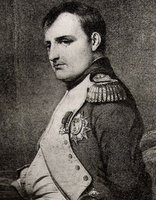 In 1804, Napolean, seeking the approval of the crowned heads of Europe, crowned himself Emporer of France. Beethoven, upon hearing the news, variously either viciously erased the name of Napolean at the top of the title page, or tore it in half (depending upon the teller of the tale), exclaiming "Now he will be worse than all of the rest of them." Ludwig, a brilliant man in his own bailiwick, had somehow not understood in the previous decade of imperialistic expansion, and personal power grabs, that Napolean was probably not the great republican that the self-appointed intelligentsia of Europe considered him to be. (In my experience, the intelligentsia are almost always self-appointed--no one else being intellectually qualified to do it).
In 1804, Napolean, seeking the approval of the crowned heads of Europe, crowned himself Emporer of France. Beethoven, upon hearing the news, variously either viciously erased the name of Napolean at the top of the title page, or tore it in half (depending upon the teller of the tale), exclaiming "Now he will be worse than all of the rest of them." Ludwig, a brilliant man in his own bailiwick, had somehow not understood in the previous decade of imperialistic expansion, and personal power grabs, that Napolean was probably not the great republican that the self-appointed intelligentsia of Europe considered him to be. (In my experience, the intelligentsia are almost always self-appointed--no one else being intellectually qualified to do it).In the years leading up to WWII, many artists of Jewish descent, as well as socialist or communist-sympathetic artists, fled Nazi Germany and Austria. They are generally applauded for their clear-headed analysis of the likely direction of the Nazi movement. With all due respect to these often fantastically gifted men and women; if one were Jewish, Socialist, or Communist, and did not leave Hitler's Germany immediately after the all-encompassing Enabling Act of 1934, one was quite, quite foolish. It was less generally clear for non-political, 'aryan' artists that Hitler would either co-opt them, or destroy them. It was not even clear until 1939 to the other European heads-of-state, that Hitler wanted the world, or as much of it as he could get. By then it was too late for most artists--or anybody else, for that matter--to leave.
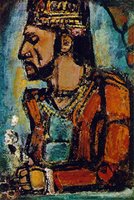 Emile Nolde, a painter (and father) of the Expressionist school, was, in the 1920's, very impressed with the Nazi mythology of the Germanic Folk, finding it compatible with his own personal philosphy. He had authored several anti-Semitic statements, and claimed that Expressionism was a uniquely 'Germanic' school. He supported the Nazi regime in the beginning, hoping, although Hitler as a failed artist was open in his hatred of modern "ugly" art, that Nolde's support of the regime would somehow spare him. He was wrong. His paintings were slowly expunged from museum collections and added, in 1937, to the exhibition of "Degenerate Art". He was personally forbidden to paint from 1941 on. After the war, because of his persecution by the Nazis, he was rapidly rehabilitated, and honored.
Emile Nolde, a painter (and father) of the Expressionist school, was, in the 1920's, very impressed with the Nazi mythology of the Germanic Folk, finding it compatible with his own personal philosphy. He had authored several anti-Semitic statements, and claimed that Expressionism was a uniquely 'Germanic' school. He supported the Nazi regime in the beginning, hoping, although Hitler as a failed artist was open in his hatred of modern "ugly" art, that Nolde's support of the regime would somehow spare him. He was wrong. His paintings were slowly expunged from museum collections and added, in 1937, to the exhibition of "Degenerate Art". He was personally forbidden to paint from 1941 on. After the war, because of his persecution by the Nazis, he was rapidly rehabilitated, and honored.Arno Breker, a young, extremely gifted sculptor, was entranced by the highly visual, art-deco styling of Nazi propaganda, although little is known of his personal political opinions. He made the decision to leave Paris, where one of his chief admirers, Jean Cocteau, had considered him one of the most important young artists of the era, and return to Berlin. There he fell rapidly under the sponsorship and tutelage of Albert Speer, Hitler's architect, and became Hitler's 'favorite' sculptor. The young man donned an SS uniform to personally escort Hitler and Göring around newly-occupied Paris in 1940
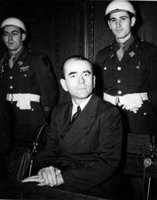 to take stock of the treasure trove of captured artworks. A sculptor of breathtaking technical ability, if less than breathtaking taste, his polished neo-classical realism fit well with the plastic creation of the idealized Nazi Superman. Just this week a retrospective opened of his surviving works (being a monumental sculptor, closely affiliated with Speer, 90% of his wartime and prewar statues and friezes were destroyed either during or in the immediate aftermath of WWII). This has occasioned great strife and discourse, calming down in the past couple of days into a long-delayed appraisal of Breker as an artist. Breker as a man has not been, and probably never will be fully understood.
to take stock of the treasure trove of captured artworks. A sculptor of breathtaking technical ability, if less than breathtaking taste, his polished neo-classical realism fit well with the plastic creation of the idealized Nazi Superman. Just this week a retrospective opened of his surviving works (being a monumental sculptor, closely affiliated with Speer, 90% of his wartime and prewar statues and friezes were destroyed either during or in the immediate aftermath of WWII). This has occasioned great strife and discourse, calming down in the past couple of days into a long-delayed appraisal of Breker as an artist. Breker as a man has not been, and probably never will be fully understood.Hugo Distler was, in 1933, a brilliant, completely unknown church musican and composer, only 25 years of age. He was far too obscure, and probably too naive to understand what the next decade would bring. One of my favorite composers of the 20th century, Distler achieved a great deal in his short life. As a devout Protestant, he immediately came under scrutiny by the paganized Nazis. His music, too modern to be a comfort to the Wagner and Bach-loving Hitler, was denounced (like Nolde) in 1937 as 'degenerate'. Despite
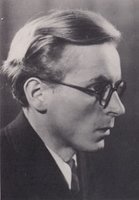 this early condemnation, Distler continued to compose and somehow continued to rise through the ranks of church musicians, taking in 1942, the position of choir master of the Lutheran Cathedral in Berlin (where Göring had his highly-publicized--and very late--society wedding). Little personal biographical information is known about Distler, which makes it hard to understand how the same year he took a highly visible and prestigous position in the heart of the capitol of the Third Reich, he took his own life at the age of 34. Ostensibly he was depressed by the ongoing war, the growing numbers of friends who had died, and the increasing likelihood of his being conscripted and sent to the meat grinder of the Russian front. It has also been speculated that he could not deal with the increasingly obtrusive Nazi Party demands on his compositional and performing output. Whatever the reason...and because of his relative obscurity, we will never know...Germany and the world lost a great talent--probably equal in abilty to the best the twentieth century had to offer.
this early condemnation, Distler continued to compose and somehow continued to rise through the ranks of church musicians, taking in 1942, the position of choir master of the Lutheran Cathedral in Berlin (where Göring had his highly-publicized--and very late--society wedding). Little personal biographical information is known about Distler, which makes it hard to understand how the same year he took a highly visible and prestigous position in the heart of the capitol of the Third Reich, he took his own life at the age of 34. Ostensibly he was depressed by the ongoing war, the growing numbers of friends who had died, and the increasing likelihood of his being conscripted and sent to the meat grinder of the Russian front. It has also been speculated that he could not deal with the increasingly obtrusive Nazi Party demands on his compositional and performing output. Whatever the reason...and because of his relative obscurity, we will never know...Germany and the world lost a great talent--probably equal in abilty to the best the twentieth century had to offer.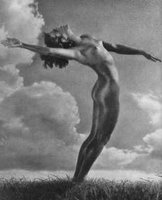 There are other, more famous examples of artists who ignored the Fascist menace; stayed, and in some cases, throve: Leni Riefenstahl, Richard Strauss, Herbert von Karajan, Wilhelm Furtwangler, Pietro Mascagni in Italy, and Ezra Pound, American poet, and Fascist apologist.
There are other, more famous examples of artists who ignored the Fascist menace; stayed, and in some cases, throve: Leni Riefenstahl, Richard Strauss, Herbert von Karajan, Wilhelm Furtwangler, Pietro Mascagni in Italy, and Ezra Pound, American poet, and Fascist apologist.P.G. Wodehouse, a brilliant and almost completely apolitical writer, was caught in the French collapse of 1940 and spent the war in an internment center in Moravia. He did a series of lightly comic radio essays for the Nazis during the war, to be beamed to England. He did not, apparently, understand that they would be used as propaganda, and was deeply hurt after the war to find himself no longer welcome at home. He spent several years in lightly comic exile on Long Island, before finally being rehabilitated in the eyes of the British public.
I did not mean for this to be just about artists and fascism, but communism is another, and even larger topic. Research then rears its ugly head. And I'm lazy.
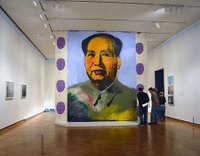 Being an artist has come to mean, over the past couple of hundred years, a complete intellectual and artistic investment in the human condition, rather than a narrow, but inspired exploration of pure art, in whatever medium. Mao considered art not have any existence outside of a political context. Unfortunately, more and more people seem to be convinced of that fantastically erroneous precept. Art can exist for Art's sake, alone. Artists, while brilliant and insightful in their own fields, when forced to give intellectual analysis of world events, are almost always in over their heads. I don't mean to excuse the actions of those who stayed behind. Most are to be pitied. But I do think that this ridiculous expectation that artists and entertainers be political sages as well, should find itself a rapid end.
Being an artist has come to mean, over the past couple of hundred years, a complete intellectual and artistic investment in the human condition, rather than a narrow, but inspired exploration of pure art, in whatever medium. Mao considered art not have any existence outside of a political context. Unfortunately, more and more people seem to be convinced of that fantastically erroneous precept. Art can exist for Art's sake, alone. Artists, while brilliant and insightful in their own fields, when forced to give intellectual analysis of world events, are almost always in over their heads. I don't mean to excuse the actions of those who stayed behind. Most are to be pitied. But I do think that this ridiculous expectation that artists and entertainers be political sages as well, should find itself a rapid end. What makes the opinions of Angelina Jolie, Tim Robbins, Charlton Heston, Ed Asner, Chris Ofili, Daniel Barenboim, or the Dixie Chicks so valuable? They are neither significantly better informed, nor even marginally more intelligent than the general public; merely more prominent. The artists of the Third Reich were, unless personally threatened, equally unlikely to accurately judge the tenor of the times. It is thus unfair to put poor, inoffensive Ricky Martin in front a TV camera and ask him about the operations and aims of the World Health Organization. It's not his thing, and we should stop expecting him to make it so. Let him go back to being all ambiguous and androgynous, and apparently irresistible to teenage girls (as mystifying and disturbing as that may be). Ms. Jolie has a 46% approval rating. If she had ever been elected to anything, that might matter.
What makes the opinions of Angelina Jolie, Tim Robbins, Charlton Heston, Ed Asner, Chris Ofili, Daniel Barenboim, or the Dixie Chicks so valuable? They are neither significantly better informed, nor even marginally more intelligent than the general public; merely more prominent. The artists of the Third Reich were, unless personally threatened, equally unlikely to accurately judge the tenor of the times. It is thus unfair to put poor, inoffensive Ricky Martin in front a TV camera and ask him about the operations and aims of the World Health Organization. It's not his thing, and we should stop expecting him to make it so. Let him go back to being all ambiguous and androgynous, and apparently irresistible to teenage girls (as mystifying and disturbing as that may be). Ms. Jolie has a 46% approval rating. If she had ever been elected to anything, that might matter.Screedily Yours,
Escutcheon Blot
P.S. I really am going on vacation now. I will be away from my desk until September. Happy August.








.jpg)






2 comments:
I heard somewhere that Brad Renfro has an approval rating of 100%.
Another fine post, with plenty to chew on. I hope you have a good vacation, EB.
Post a Comment